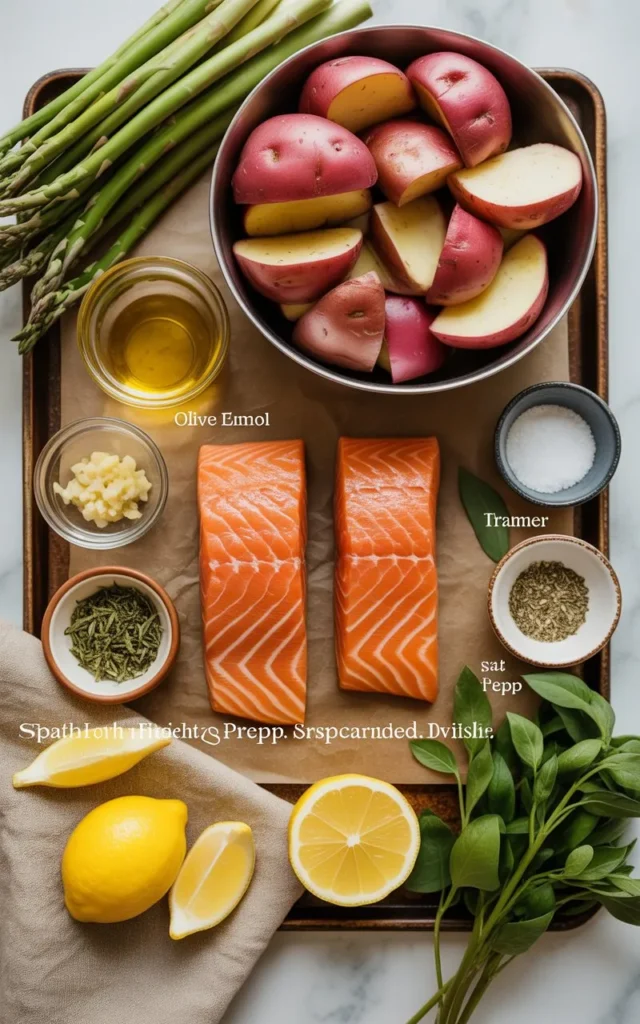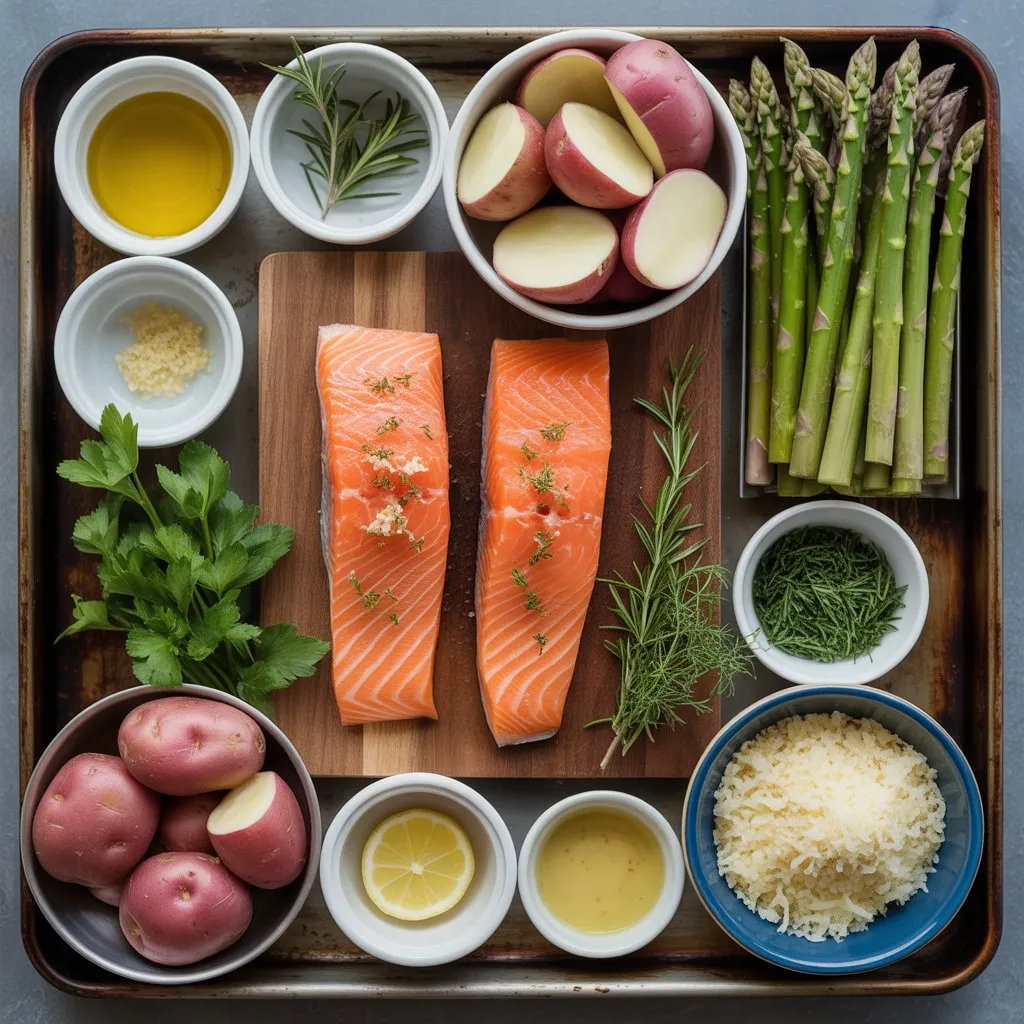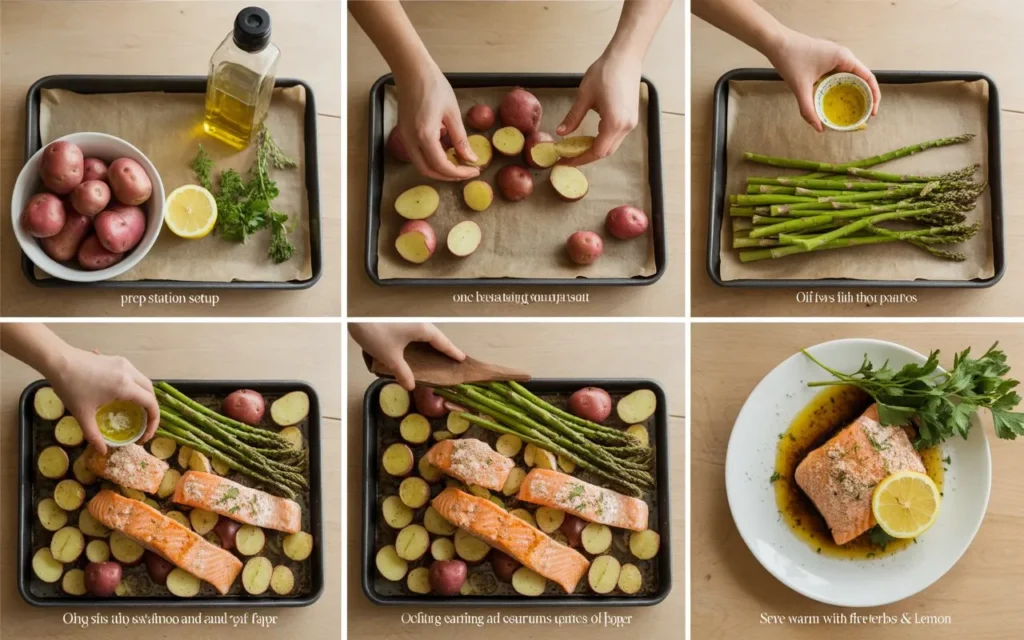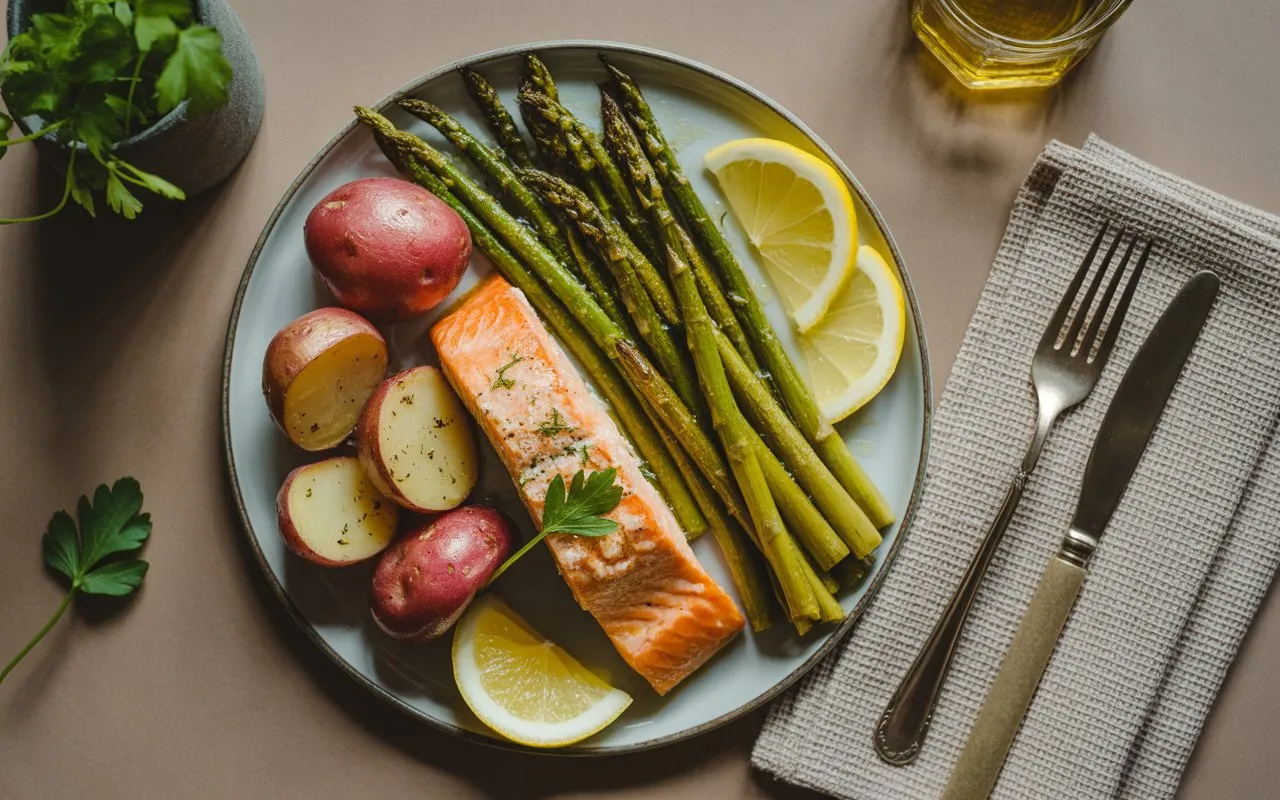Searching for an easy, tasty, and nutritious supper that takes less than an hour to prepare and requires little cleanup? Salmon Baked with Red Potatoes and Asparagus is a complete, nutrient-dense one-pan meal that includes golden roasted red potatoes, crisp-tender asparagus, and flaky salmon fillets.
In addition to being delicious, this dish is a great example of balance because it is high in heart-healthy fats, lean protein, and vegetables that are high in fiber. This recipe is perfect for anyone who is a busy parent, meal planner, or simply in the mood for a hearty home-cooked supper.
The Reason This Dish Is Effective
The traditional pairing of salmon, potatoes, and asparagus is for a reason: their flavors, textures, and nutritional value enhance one another. This is why it’s a meal that should be a staple:
Nutrition in Balance
- Omega-3s, protein, and vitamin D are all found in salmon.
- Red potatoes provide potassium and fiber.
- Asparagus adds crunch, folate, and antioxidants.
Convenience with One Pan
- No complicated devices or juggling several pans. All you need to do is put everything on a sheet pan, roast it, and be done.
Tasty and Adaptable
- Herbs, sauces, or your own spice blend can easily elevate this dish, which has natural ingredients and basic seasoning.
Recipe for Baked Salmon with Red Potatoes and Asparagus
Ingredients for 2–4 servings
Regarding the Main Course:

- Two 6-ounce salmon fillets, skin on or off
- One pound of red potatoes, cut into ½-inch pieces or quartered
- One bunch of trimmed asparagus
- Two tablespoons of olive oil
- Two minced garlic cloves
- One teaspoon of lemon zest
- A half-lemon’s juice
- One teaspoon of dried rosemary or thyme, or both
- To taste, add salt and pepper.
Extras that are optional:

- One tablespoon of Dijon mustard, combined with the salmon marinade
- One tablespoon of grated Parmesan cheese for the potatoes
- Garnish with fresh parsley or dill.
Directions

1. Warm up and get ready
- Turn the oven on to 400°F, or 200°C. To make cleanup easier, line a baking sheet with foil or parchment paper.
2. Season the potatoes and roast them.
- Red potatoes can be put straight onto the sheet pan or in a bowl. Season with salt, pepper, rosemary or thyme, and drizzle with 1 tablespoon olive oil. Toss to coat. They should start to soften and brown after 20 to 25 minutes of roasting.
3. Prepare the asparagus and salmon.
- Drizzle the salmon fillets with the leftover olive oil, lemon juice, garlic, and lemon zest while the potatoes roast. Add salt and pepper for seasoning. Add a small amount of olive oil and season the asparagus.
4. Put the asparagus and salmon in the pan.
- Take the potatoes out of the oven. Place the salmon and asparagus on the sheet after pushing them aside. The salmon should be cooked through and flake easily after 12 to 15 minutes of baking.
5. Serve with garnish.
- Add more lemon juice and fresh herbs on top. Enjoy your entire one-pan dinner warm.
Nutritional Analysis (Per Serving)
One salmon fillet, half a cup of potatoes, and half a cup of asparagus are served.
- 420–470 kcal
- 30–35g of protein
- 25–30g of carbohydrates
- Fiber: 4-5 grams
- 20–25g of fat
- Omega-3s: more than 1200 mg
This macro-friendly, well-balanced meal is excellent for anyone controlling blood sugar, weight, or general health.
Each Ingredient’s Health Benefits
Salmon: Energy for the Heart and Brain
- Rich in EPA and DHA, two omega-3 fatty acids
- enhances mood and cognitive performance
- anti-inflammatory qualities
- A great source of vitamin D, selenium, and B12.
Red Potatoes: Ingenious Carbohydrates
- More fiber than white potatoes, especially when skinned
- Glycemic index lower than anticipated
- Give resistant starch (when cooled and reheated), potassium, and vitamin C.
Asparagus: Support for Digestion and Detox
- High in glutathione, vitamin K, and folate
- promotes the health of the liver
- Gut bacteria are fueled by prebiotic fiber.
Success Advice
1. Avoid Overcooking the Salmon
Watch it for the final five minutes. When salmon flakes easily with a fork and reaches an internal temperature of 135 to 140°F (rested), it is considered perfect.
2. Evenly Cut Potatoes
Pieces that are uniform roast more evenly. Don’t cut them too thin or too thick.
3. Use Flavor Enhancers to Raise
- Stone-ground mustard or Dijon mustard
- Herb butter with garlic
- Caper-lemon sauce
- A balsamic glaze or tahini drizzle
4. Make Generous Use of Fresh Herbs
- When added to roasted vegetables or salmon, fresh dill, parsley, chives, or basil significantly improves the flavor.
Preparing Meals and Using Leftovers
This dish makes a great meal prep and tastes even better the following day.
Storage:
- Keep for up to three or four days in airtight containers.
- To preserve texture, try to keep the salmon, potatoes, and asparagus apart.
Warm up again:
- Warm again in a toaster oven or in a skillet over medium heat.
- The salmon may dry out if you microwave it for an extended period of time.
Freeze:
- Cooked potatoes and salmon can be frozen for up to two months.
- Asparagus turns mushy when frozen.
Alternatives to Consider
Salmon Glazed with Spicy Sriracha
- For a spicy-sweet glaze, combine sriracha, honey, soy sauce, and garlic.
Salmon with Honey Mustard
- Before baking, brush salmon with honey, Dijon mustard, and garlic.
Red potatoes can be substituted for:
- Sweet potatoes
- Baby gold potatoes or fingerling potatoes
- Cauliflower (for a version with fewer carbohydrates)
Optional: Add cheese
For added richness, top the roasted asparagus with Parmesan or feta.
Can Someone with Gestational Diabetes Eat This Meal?
Indeed! Here’s why, as well as how to further customize it:
- Salmon is high in protein and omega-3 fatty acids and low in carbohydrates.
- Red potatoes are blood sugar-friendly when portioned out and paired with fat or protein.
- Asparagus is low in net carbohydrates, high in fiber, and non-starchy.
Advice:
- Eat no more than ½ cup of cooked potatoes at a time.
- To lessen blood sugar spikes, use a healthy fat, such as olive oil.
- To boost satisfaction, serve with yogurt dressing or lemon-tahini sauce.
Tips for Sustainability
- Select salmon that is sustainably farmed or wild-caught.
- Make use of in-season asparagus and local red potatoes.
- Use glass containers to store leftovers instead of plastic wrap.
- Repurpose leftovers: the following day, use the salmon and asparagus in a salad or grain bowl.
Commonly Asked Questions
Q1. Is it possible to use frozen salmon?
- Indeed! Before seasoning and baking, let it fully thaw. To prevent too much moisture, pat dry.
Q2: Is it possible to air fry the potatoes or salmon?
- Indeed. Salmon should be air-fried for 10 to 12 minutes at 375°F. You can pre-roast potatoes in the air fryer for 15 to 20 minutes at 400°F.
Q3: What can I use in place of asparagus?
Try:
- Green beans
- Florets of broccoli
- Bell peppers or zucchini
Q4: How can I eliminate gluten and dairy?
- Naturally, it’s both! Just stay away from sauces that contain gluten-based thickeners or cheese toppings.
Concluding remarks
Everything we enjoy in a dinner is included in this salmon baked with red potatoes and asparagus:
- Quick
- Tasteful
- Rich in nutrients
- Simple to tidy up
- Additionally, it is infinitely customizable.
This one-pan meal makes healthy eating incredibly satisfying — with little effort — whether you’re cooking for one person, your family, or your weekly meal prep.
Give It a Try?
If you try this recipe, please tag us with #SheetPanSalmon on Instagram so we can see your mouthwatering creations!


Leave a Reply